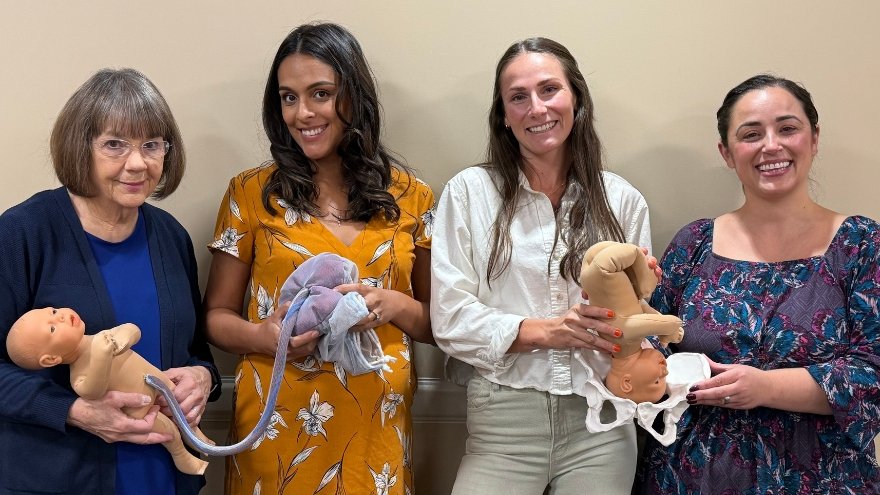

Why are timely vaccinations important? Childhood vaccinations are scheduled and vaccines are administered when young bodies require immediate protection or need to build immunity for diseases and illnesses we may encounter throughout our lives. Delaying recommended vaccinations puts children at higher risk for diseases that can affect them more harshly, like pertussis (whooping cough), which is especially dangerous for babies.
Dr. Brittany Lemons shares why timely vaccines matter. Learn more about her care—or schedule your child’s visit today.
Meet Dr. Lemons & Book Now
Vaccination Benefits
- Vaccinations save the lives of 1,000s of children (and adults) every year
- Vaccinations protect us from illnesses that can lead to cancer, hospital stays, life-long health issues & even death
Vaccinations help protect those who receive the vaccines and, through herd immunity, also help protect the unvaccinated and seniors whose immunity may have waned.
What’s the recommended vaccine schedule for children?
In the U.S., we follow the CDC’s vaccine schedule for children and teens up to 18 years of age. The schedule also provides notes regarding missed or late vaccine doses and how to properly “catch-up.” If your child is missing one of the vaccinations listed below, is not quite on-schedule with the recommended timeline or you have any questions regarding vaccines or timings, please reach out to your child’s provider.
Vaccine Schedule Birth to 4 Years:
- Birth – First vaccine for hepatitis B and may receive respiratory syncytial virus (RSV)* vaccine
- 2, 4 & 6 months of age – Vaccines/boosters for tetanus, diphtheria and pertussis (DTaP), polio (IPV), haemophilus influenza type B (HiB), pneumonia, hepatitis B and rotavirus
- 6 months to 4 years of age – COVID-19 vaccine, 1-2 doses*
- 1 year of age – First dose of measles, mumps, rubella with varicella for chicken pox (MMRV) vaccine and boosters for hepatitis A, HiB and pneumonia
- 15 months of age – 4th dose of DTaP
- 18 months of age – 2nd dose of hepatitis A
- 4 years of age – Final dose of MMRV, TDaP and IPV vaccines
*Conditions apply. See your child’s provider.
Vaccine Schedule 5 Years & Older:
CDC and American Academy of Pediatrics (AAP) also recommend the following vaccine schedule for children as they grow:
- Prior to starting middle school – TDaP and meningitis vaccines/boosters
- 9-12 years of age – AAP suggests children (and those up to 26 years of age who have not been adequately vaccinated) receive the HPV vaccine to help protect against developing certain cancers as adults
- Children up to 18 years of age & adults – COVID-19 vaccines are recommended, especially for those with medical conditions such as asthma and diabetes
For more vaccination information, please refer to the CDC recommended child and adolescent immunization schedule.
Any tips on preparing my child for a vaccination?
Many parents worry about side effects like pain and fever for their children after getting vaccinations. Studies have shown that giving Tylenol prior to vaccines can decrease their effectiveness. That’s why providers recommend parents and caregivers wait until after vaccines are administered before giving Tylenol or Ibuprofen, and then only if symptoms develop.
Do vaccinations wear off?
Many vaccinations provide life-long immunity while others may wear off over time. Vaccines are given to children when they are at most risk for contracting diseases as well as when they are at the highest risk of severe complications from a disease. So even if immunity fades over time, it is important receive vaccinations on time to protect children during these high-risk windows.
Doctor's Advice:
A child receiving a vaccination can feel scary for some parents — and misinformation online can make things confusing.
What Parents Should Do:
- Talk to your child’s healthcare provider. Ask questions and share any concerns you have about vaccines.
- Rely on trusted medical guidance. Social media and internet sources may spread misinformation.
- Remember the shared goal. Providers and parents alike want children to be as healthy as possible — and vaccines are a key part of that.
Related Blogs


Protect Yourself, Your Kids & Others with a Flu Shot
